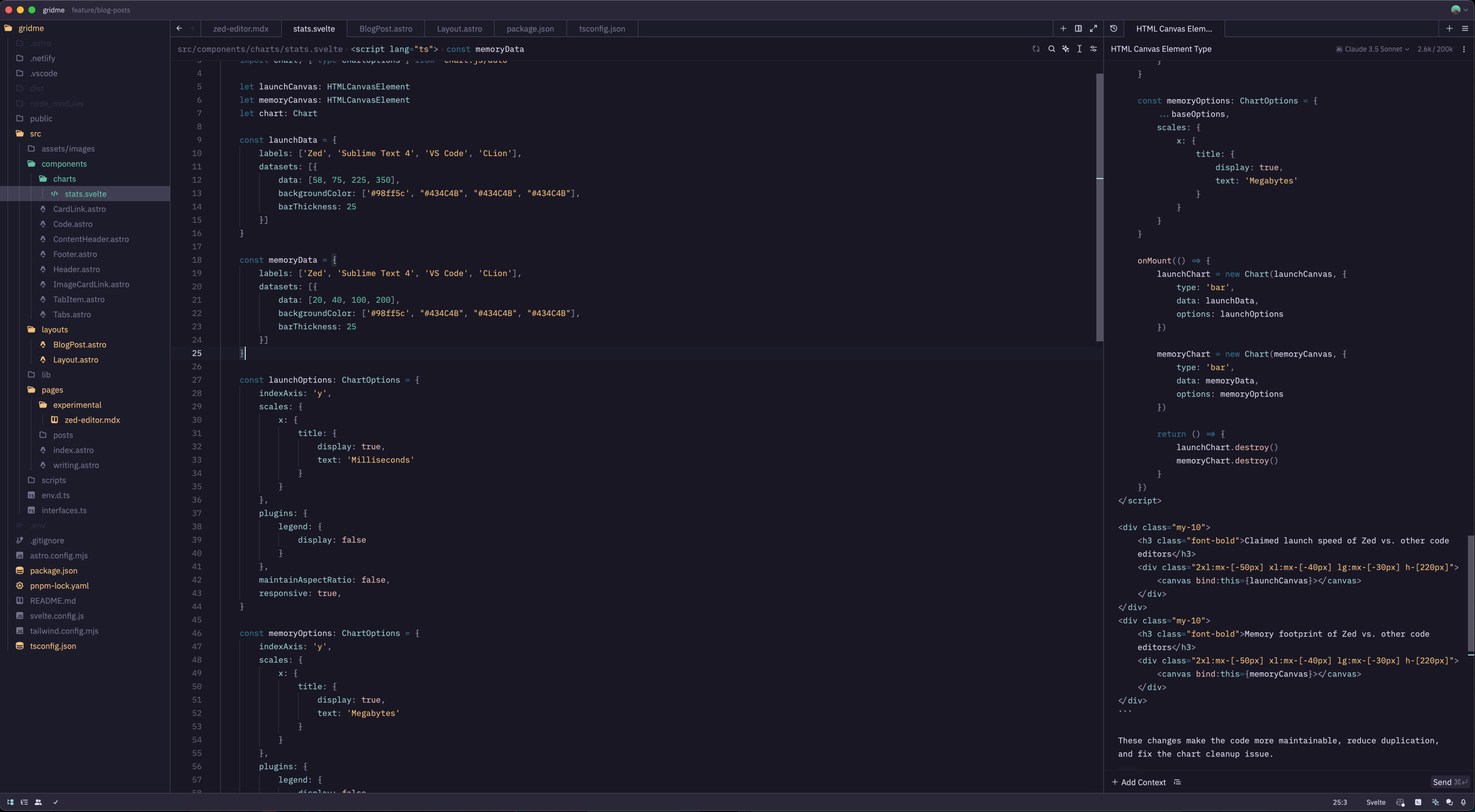Is Zed the VS Code killer? + + + +
METADATA
- FORFATTER
- Martin Sollien
- DATO
- 11 Nov 24
- KATEGORI
- Tools
Zed editor is made by the renowned team behind the Atom text editor, and stands to be a serious contender to VS Code. I've tested it and given it some thought.
Preface
I'm not in any way endorsed or sponsored by the Zed team. I write this freely and from my own genuine personal experience.
Zed. I’ve never really liked that name. Somehow, it sounds kind of edgy in an uncool way. It also reminds me of Dr. Zed from Borderlands and the champion Zed from League of Legends. Not that there’s anything wrong with at least one of those.
Apart from the name, I think that Zed (the editor) presents itself very well. It’s just one letter away from being named Zen. That’s 33 % away from tranquility, which is fitting because this editor feels about 33 % shy of capturing a significant developer market. It’s close to something innovative and great.
Zed comes from the team behind the Electron based Atom, an editor that was sunset after Microsoft’s acquisition. Zed takes a completely different approach by using Rust for its core architecture. Can they ensure it won’t meet the same fate as Atom?
Second impressions Second impressions
This is actually not my first rodeo with the Zed editor. I initially tried it when it was extensionless and lacking. It didn’t even support Linux, which is to say it didn’t affect me who uses Mac. Coding without extensions, however, was not a fun experience.

A behind-the-scenes screenshot of the making of this article in Zed.
As a web developer, I’ve grown accustomed to the warm embrace of ESLint and various language servers. Coding without these and Zed might as well just be Notepad++. With time, however, we’ve been graced by the open source wizards that contribute to Zed, and we now have multiple extensions in place, as well as built-in support for ESLint. For someone who frequently uses Vue, Astro, and TypeScript, this support is a welcomed addition.
The paradox of Zed’s reductive design
The existence of Zed is somewhat paradoxical. Its reductive design fosters a tranquil developer experience, but its lack of certain features limits its potential.
I’ve found that I can do most of my job on Zed – on my Mac. Windows support is still absent, though I feel it’s right around the corner. It’s customizeable, but not nearly as customizeable as VS Code, which presents a dilemma. Before switching, I had tailored VS Code to be as minimal as possible. I tried to reduce the amount of unused UI elements as much as possible to remove visual noise. I like a clean and minimal interface. Zed offers this, and it’s much better than my VS Code. At the same time, I don’t know if I trust the Zed developers to continue in this direction.
The speed of Rust
Simplicity encourages a lightweight experience. Imagine if Zed had a minimal, quiet interface, only to by bogged down by lag, slow launch time, and high memory footprint. Thankfully, that’s not the case. The vision of minimalism extends seamlessly from the UI to the back-end.
Claimed launch speed of Zed vs. other code editors
Memory footprint of Zed vs. other code editors
While launch speed isn’t a critical for development (who really cares about saving half a second every time you open a program), it’s the implied general speed behind this that remains interesting. Zed feels very quick during usage, and it never seems to slow down or lag during tasks. It conveys a very smooth user experience. That is something which I can’t say about VS Code, which frequently has small, glitchy interactions, even on a modern computer.
Unparalleled AI integration
Zed has full AI integration, including Anthropic’s Claude 3.5 Sonnet on the free plan. I’ve used a fair share of AI’s for coding these last years, including ChatGPT, Codeium, and GitHub Copilot. For coding Claude 3.5 Sonnet is by far the most impressive.
Coding proficiency of Claude 3.5 vs. other AI models
Not only does it provide impressive answers, it also has a fluid integration into Zed. I can easily select a block of code, or even a whole tab, and it offers suggestions that makes me believe it has a deeper understanding of code and errors than other models.
Zed also have multiple other features I haven’t tried. It supposedly have extensive collaboration tooling. To be frank, I don’t think I will ever touch those features. But I might see the value if you do pair-programming.
The last word
Zed is currently my favorite editor. Every time I’m on my Windows machine and have to open VS Code, I always think “I wish this was Zed”. Not that VS Code is a bad editor; for the right tech stack it still offers more extensive options than Zed. But Zed just feels better. It’s more fluid, minimal, faster, and the AI integration is my new favorite tool for coding. Microsoft better not buy and sunset this.